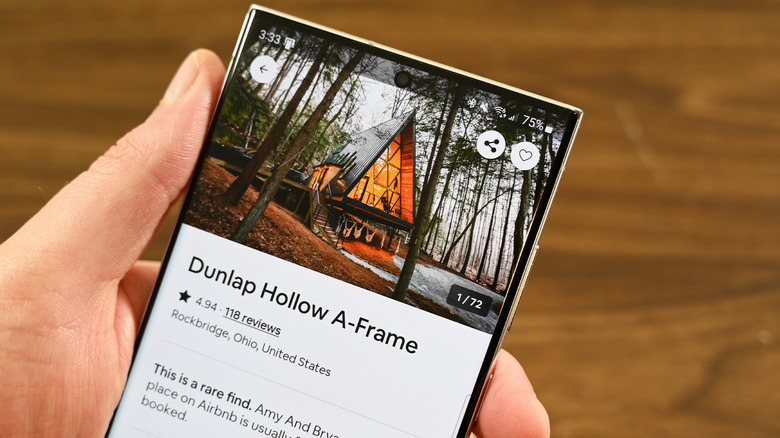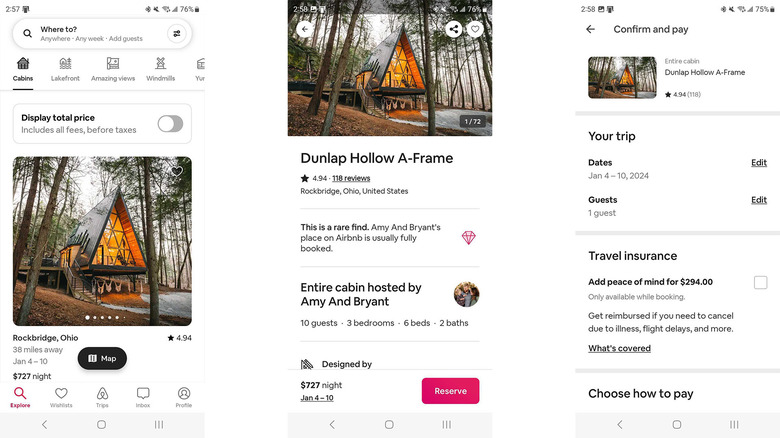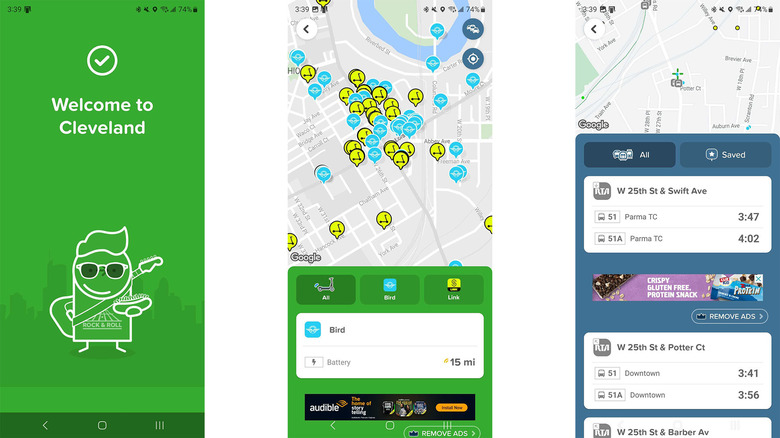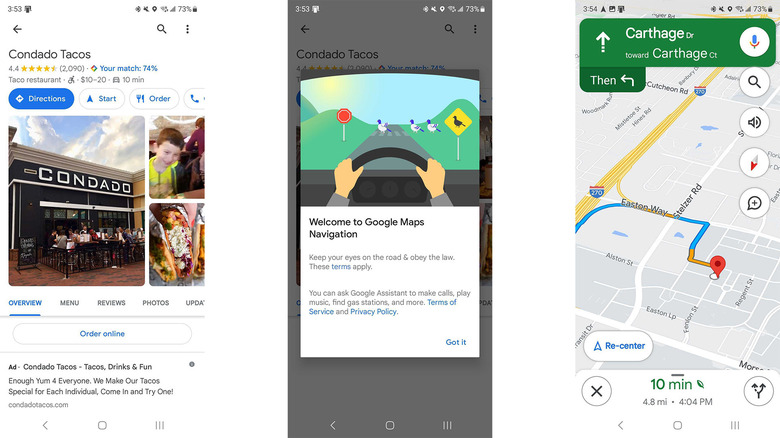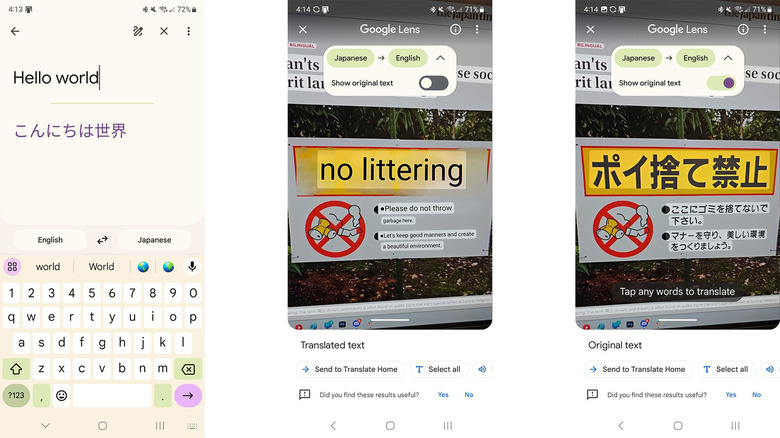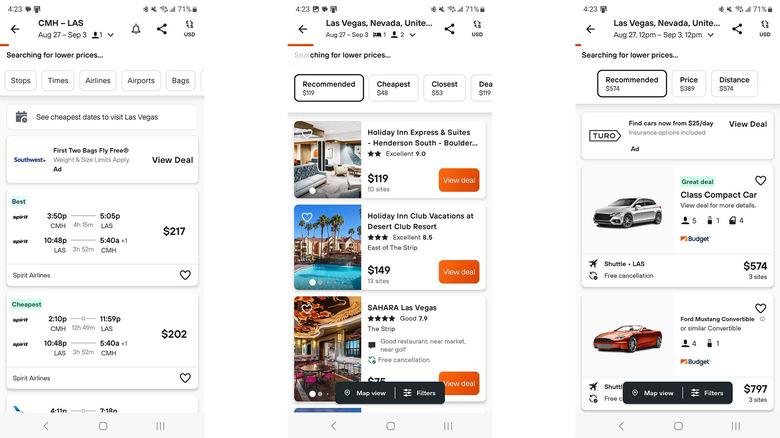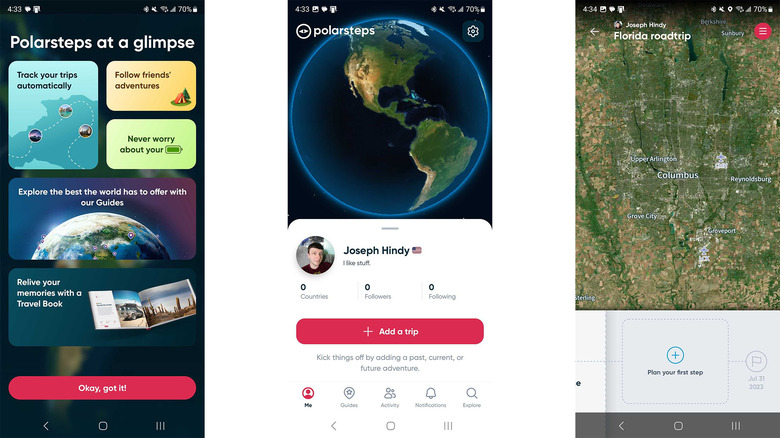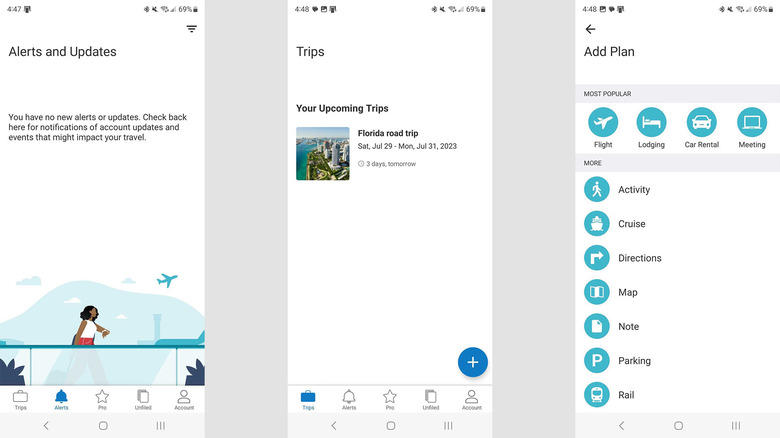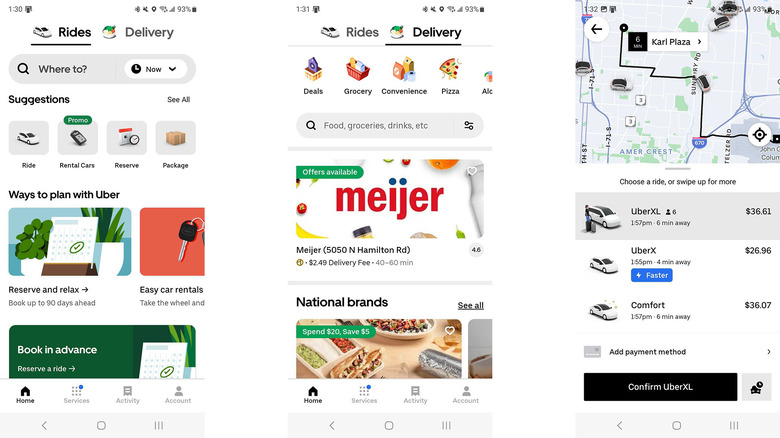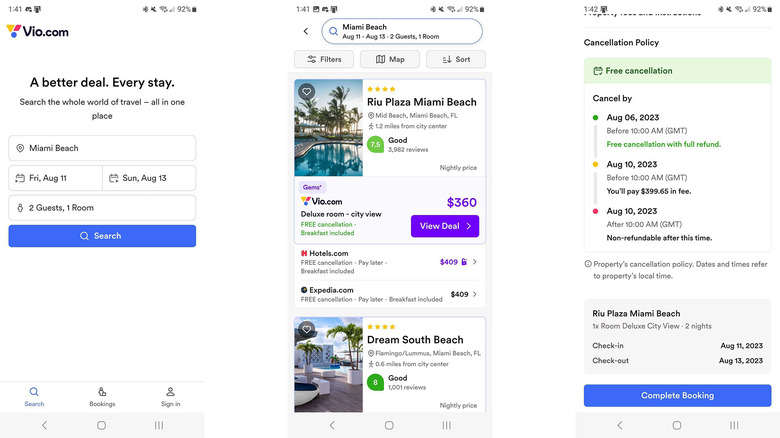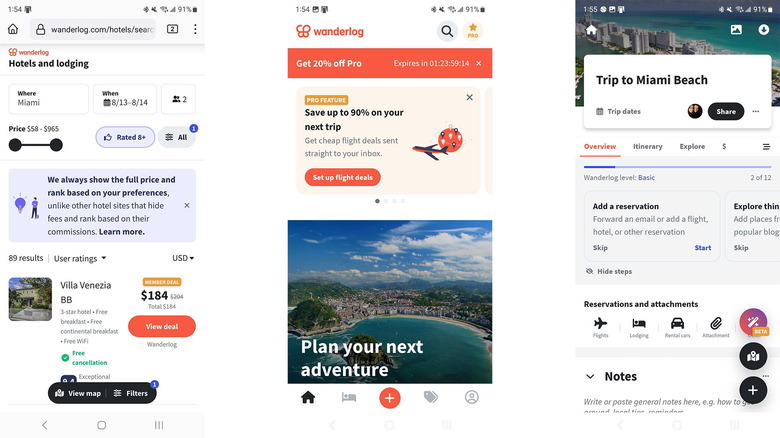10 Of The Best Travel Apps For Android That Make Trip Planning A Breeze
Travel is about as easy as it's ever been. You can hop on a plane, go anywhere, find accommodations once you're there, and even hail a taxi with just a few clicks or taps. Prices can be quite reasonable as long as you're keeping your expectations in check. It's not unusual for folks to take a weekend trip somewhere for no reason other than to just get out of the house. Luckily, there are plenty of good travel apps for Android to help with planning.
A smartphone has plenty of utility in a space like this. You keep it on you all the time, even on airplanes, so it's not a bad place to store your itinerary. People are relying on their smartphones a lot more for travel compared to even just a few years ago. Apps for things like hotels and transportation booking have improved by a large amount over the last five years or so. Additionally, new tools have made their way to the market.
In some cases, you may not even need an app. For instance, Google Travel is an aggregate website that includes flights, hotels, rentals, and discovery features for when you arrive in your destination city. Apps tend to be a little more reliable, though, so let's take a look at some good ones.
Airbnb
Airbnb is a popular travel app that lets you rent out establishments that are usually owned by real people. There are a few benefits to this approach. For starters, it's a vastly different experience than the same old hotel stay that we all know and tolerate. There are also a variety of properties available for rent in most regions, including cabins, beachfront properties, and other interesting accommodations. It's a nice way to spice up your trip without changing your itinerary too much. It's not a leap in logic to assume that a beach trip would be more fun in a beach house rather than a standard hotel.
However, there are some downsides to Airbnb. It's generally more expensive than a traditional hotel stay, especially if you go for something more exotic. For instance, we found a wonderful cabin in Ohio that costs over $700 per day to rent. That's a $2,100 weekend before taking any other expenses into consideration. Additionally, you can find the occasional horror story about owners and tenants causing drama. A little vigilance and some patience can help avoid such complications.
There aren't many apps like Airbnb, although some are trying. They include Vrbo, Booking.com, Hipcamp, and a few others, but none are as established as Airbnb. The app is free to use, but rentals obviously cost money.
Citymapper
Citymapper is a unique app for travelers. It sources its map information from Google Maps, so you're not using something entirely different from what you'd normally use. Where Citymapper excels is in its depth of choice. Let's say you want to go from West Side Market to the Agora Theater in Cleveland, Ohio. Citymapper not only gives you directions but also gives you options for your transportation. You can walk, take the bus, rent a scooter, or hail a cab. There is built-in support for Uber, Lyft, and several other transportation companies for cab service and scooter rentals. There are even bus schedules to help plan your day around local transportation.
Yes, it is possible to recreate a lot of this in Google Maps. However, Citymapper is built specifically for this function, so the layout of the app makes a little more sense for folks who don't often use these types of services. The only real downside of Citymapper is the lack of support for many U.S. cities. For example, in Ohio the app supports Cleveland but not Cincinnati or Columbus. That's a bit of an oversight, although there is always Google Maps to fall back on if you're somewhere without official Citymapper support.
Citymapper is free to use with advertising. You can remove the advertising with a $1.49 per month subscription.
Google Maps
Google Maps is an excellent choice for obvious reasons. It features near-ubiquitous support for most places you'd want to go, a laundry list of features for all sorts of activities, and even competes favorably with Yelp for user reviews. It's a go-to, all-in-one solution that nullifies a lot of its competitors. You can even download maps for offline use if you expect to be out of range of an Internet connection. Otherwise, most people know how Google Maps works. You can get navigation to just about anywhere. There is also support for walking, public transportation, and more.
What makes Google Maps special are a lot of the smaller, less-used features. For example, you can share your location with a friend or family member. They can use Google Maps to find your location and get to you if needed. You can also adjust your routes to save gas and search for the cheapest gas near you. The gas station prices aren't always exactly current, but it gives you a good idea. It'll even show you the speed limit when used with Android Auto. Not every feature is supported everywhere, so your mileage may vary.
Google Maps has a lot of competition in this space, such as Apple Maps. Some alternatives, like Maps.me and OsmAnd, use OpenStreetMap as a source, which can occasionally be more reliable than Google Maps and may also include some extra hiking trails or paths that Maps doesn't. Otherwise, Google Maps stands alone at the top.
Google Translate
Google Translate is another excellent app for travelers. After all, not everybody has the time or capability to learn a new foreign language for each trip they take. Google Translate is good at a number of things. You can easily type in whatever you want into the app and translate it to your language of choice. That's the main function, and it's perfectly usable in day-to-day applications. Other features, however, may see more use in practice, such as the ability of the app to take a picture of a menu or sign and translate it for you.
Perhaps the most useful feature is the conversation mode. You simply choose the languages you want and speak into the app. The app uses speech-to-text to translate what you said so the other party can read it. They can then do the same in reverse. This lets you have full conversations with people who don't speak your language. You can also use the app offline provided that you downloaded the languages you need first.
The great part about it is that it just works without much of a learning curve, so most people should be able to figure this out relatively quickly. Google Translate doesn't have a lot of competition. Microsoft Translator and DeepL Translate are making strides, but they aren't quite there yet.
Kayak
Kayak is one of many apps to book travel accommodations. It lets you search for flights, hotels, and rental cars for your trip, all within essentially the same experience. For flights, you input your start and end destinations and dates, which leads the app to pull up available flights. There is then a process that sorts them by the cheapest so you can find the best deals. Looking for hotels and rental cards is the same. You input your destination and dates, and the app tries to find you the best deals.
There are some extras that make life a little easier. Kayak's app layout is functional and quite easy to read. Many competitors do this as well, but Kayak just has a good feel. Additionally, you can surf for alternative ideas like ridesharing for car rentals or vacation homes instead of hotel accommodations. There are plenty of filters to nail down exactly what you want. Booking accommodations through the app is a fairly simple process and not much different from most other apps.
Kayak has a ton of competitors in this space, including Priceline, Booking.com, Expedia, Hotels.com, and at least a couple dozen others. Choosing one is a lot like choosing a grocery store — different services have different sales at different times. You should use the one that saves you the most money at the time you plan your trip.
Polarsteps
Polarsteps is a travel tracker app, although it is more recreational than it is functional. The app lets you plan your trip and then log the trip as you take it. You can store things like photos, notes, and other memories along your journey. The app shows you all of those memories on a neat world map. It's an overall nice way to visualize your trip after you're done taking it. In addition, you can share your trip with family and friends so they can keep track of you as you progress while commenting on your photos and memories.
The app works quite well in practice. Photos and other content upload quickly, and the social elements are done well. The only real downside of the app is that it is for recreational purposes only. You can't manage an itinerary, book hotels, or do any actual planning with Polarsteps. This is only for capturing memories.
Polarsteps also gives you the option of ordering a travel book with memories of your travels. You can also revisit old trips through the app if you decide to keep it for multiple trips. Polarsteps is free to use. You only have to spend money on the travel book if you want it.
There are many apps that do variations of this same thing. FindPenguins is an up-and-coming app in this space that does a lot of the same stuff as Polarsteps.
TripIt
TripIt is an all-in-one travel planner. It starts by having you create a trip in the app. From there, you add in your itinerary, travel plans, and other information. Everything is manual, so you don't have to worry about syncing anything. You can enter everything from flight numbers to hotel reservation confirmation numbers. There is also an alerts system for reminders about those flights and hotel reservations. It's a nice overall package that takes most types of travel into consideration. The app has a clean look, and it shouldn't take long to get the gist of how everything works.
There are a variety of other features as well. You can store travel documents like passports, Visas, and driver's licenses. There are whole sections for alternate modes of transportation such as cruise ships, trains, and public transportation. The navigation feature integrates directly with Google Maps for easy storage of your road trip directions. Those who opt for the optional $48.99 per year subscription also get access to a point tracker for your loyalty programs as well as an Inner Circle feature to invite other people to plan trips with you.
Like other travel apps, this one has a lot of competition. RoadTrippers, Passporter, and TripCase are a few decent examples. TripIt does the job better and with less hassle than most of its competitors, so it's a great place to start.
Uber
Uber is a must for travelers. It's ubiquitous in the U.S. at least, and almost everybody knows how to use it. It's a ridesharing service that operates similarly to a taxi service — you hire a driver to take you from point A to point B. There's a rating system for both passengers and drivers to keep everyone honest.
Otherwise, it's a fairly straightforward endeavor. The app is easy to use, and you can schedule rides for the future if needed as well. At this point, Uber has been around long enough that most people have used it at least once. There aren't many surprises here.
Uber has consolidated a lot of its functions within its main app. That means you can order food and have it delivered to your location without using the Uber Eats app. There are also options for pharmacy, alcohol, retail, and grocery delivery. You can even have a driver deliver a package from your location to its destination if you need it there quickly and don't mind paying extra for it. Rounding out the features is a car rental service partnership with Hertz that allows you to rent a car if you prefer.
Uber has competition all around the world. Lyft is its biggest competitor and it's good as a ridesharing service. Other countries may have services specific to that location. You'll want to do some research if you're traveling abroad.
Vio
Vio is a hotel deal comparison app. Earlier, we talked about Kayak and how it had tons of competitors in this space. Vio, and apps like it, aggregate prices from many of those places so you can price shop across services in a single spot. The app shows you the best deal it was able to find, even if that deal wasn't directly from Vio, by sourcing prices from over 100 travel sites. The app also boasts millions of hotel options around the world. Pair that with a solid UI that doesn't feel overly cluttered, and you have an app that ends up feeling easy to use.
All you have to do is input your destination city to start browsing. Once you find a hotel you like, you can view more details within the app. From there, there are two things that can happen. You can continue booking the hotel from the app if the deal is directly from Vio. Otherwise, the app throws you to the other service to complete the process. For example, if you find a good deal using Booking.com, the app will send you to that website so you can claim it.
There are a variety of services that do something similar. Trivago is another popular option for comparing hotel prices, and you can use either one as they both work about the same and compare the same data.
Wanderlog
Wanderlog is a travel planner app. It offers an all-in-one solution to essentially the entire experience. You can plan the trip by inputting your various reservations, itineraries, and other plans. The app keeps track of everything for easy recall later. In addition, Wanderlog has a ton of little extras that can help make things easier.
For instance, you can compare hotel and flight prices. There is also a collaboration feature that is available for free. You can add people to your trip so they can see all of the information as well. It might seem a bit cluttered at first but it gets easier the more you use it.
In general, Wanderlog is easy to use. There are a lot of distracting elements as the app sends you deals and coupons for various travel-related services. Some of those are genuinely useful, so it's not the biggest deal. The app requires an internet connection to use if you're on the free version. You can get offline support along with Google Maps support, fewer restrictions, and even more deals for an optional $39.99 per month. The subscription isn't necessary unless you intend on using the app very heavily.
What makes this app unique is that it's a mix between an aggregator service like Vio and a travel planner like TripIt. You can find this same experience across two or three apps if you want to.
